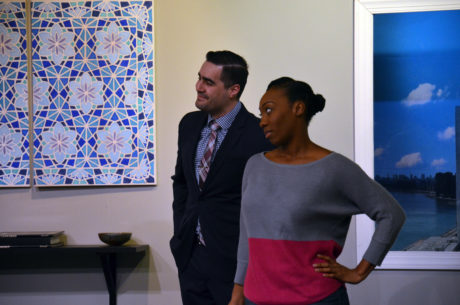Your mother no doubt told you not to discuss religion or politics over dinner. In Ayad Akhtar’s Disgraced, now playing at the Greenbelt Arts Center, the exchanges among the characters during the play’s central dinner party scene seldom depart from religion and politics, at ever-increasing decibel levels. This generates misery for the characters, albeit giving the audience some appetizers for thought about the perniciousness of identities founded on religion, culture, race, or career.

The play’s central character is Amir Kapoor (Scott Stofko), a New York corporate lawyer of Pakistani descent who, determined to assimilate to the dominant American culture, has changed his name to one that sounds more Indian than Pakistani and is militantly secular. Stofko’s performance, energetic and physically commanding though it is, becomes the production’s main problem. When you start at a very high level of volume and anger that seldom abates, you leave yourself little space to create a character arc or play a character’s nuances. There are ways to show intensity and strong emotion that do not depend primarily on loudness, and it is worth an actor’s while to explore them.
Amir’s wife Emily (Alison Starr), a white American artist, seeks to emulate Islamic art in her work, and in her conversations with her husband expresses greater admiration for Islamic culture than he does. Her art – there is a nice example hung on the back wall of the set (Jody Aldave is credited with scenic painting) – is clearly derivative, and today would likely be criticized as cultural appropriation. At play’s end, she admits it is “naïve.” As written and faithfully embodied by Starr, Emily is shallow, often thoughtlessly so, as when she urges Amir to attend a hearing for an imam accused of raising money for Hamas, endangering his career, or allows herself to slip into a brief affair.
She does, however, paint a portrait of Amir – based on a Velazquez portrait of his onetime slave – that summarizes Akhtar’s theme of the double consciousness of someone like Amir who is in but not of his society. Amanda (Rey) Sykes is credited with creating the image, which is unveiled with considerable impact in the play’s final moments.
The third family member is Amir’s nephew Hussein (Ali Cheraghpour), who when first seen has changed his name to Abe in an effort to assimilate. Sensitive to prejudice against Muslims, he joins Emily in urging Amir to attend the imam’s hearing, and later, feeling that assimilation is futile, becomes more traditional and militant in his dress and outlook.
Cheraghpour, in a two-scene role, does well at laying the foundation for his character’s change and making his self-radicalized incarnation believable.
The dinner guests are Isaac (David Kimmelman), a Jewish art curator who Emily hopes will help her career, and his wife Jory (Lailoni Otha), an African-American law firm colleague and, as it turns out, competitor of Amir. Kimmelman provides the most subtle and varied characterization of the evening, his mixed motives with respect to Emily, too-facile artistic judgment, wry comparison of Islam and Mormonism, and willingness to match Amir’s religious- and culturally-based outrage in the dinner scene adding dimensions to his performance. In a smaller role, Otha has opportunities to react to the other diners’ words and actions and, as she is leaving, shows a brief, effective glimpse of the character’s steely ambition in the Hobbesian world of high-stakes Manhattan law practice.
The script tends toward the schematic, Akhtar effortfully packing a catalog of contemporary fracture lines concerning Islam, Judaism, race, and careerism into a tight one-act structure. That said, the play has nuggets of excellent writing. Amir’s critique of Islam is striking (V.S. Naipaul would likely have concurred), and Isaac’s description of Emily’s art is – whether or not so intended – a clever satire on pretentious artistic statements of the sort often found next to gallery exhibits.

Bob Kleinberg’s direction keeps the pace moving smartly and allows the secrets and lies that almost all of the characters harbor to unfold in ways that sharpen the conflicts that drive the action. The most destructive lies, perhaps, are those one tells to oneself. (In this respect, the play, particularly with respect to its principal character’s trajectory, has interesting similarities to Greenbelt’s previous show, Topher Payne’s Perfect Arrangement.) There is a shocking moment of violence late in the play, which Stofko, who acted as fight choreographer, pulls off powerfully and convincingly.
Kleinberg’s set design is a functional apartment, though one furnished at a considerably more rudimentary level than the characters’ level of affluence might suggest. Tom Gill’s lighting design is unobtrusive, having its most dramatic moment at the very end of the play. Den Gilbin’s sound design features music before the show and during its longest scene change that, given the play’s content, seems oddly peaceful, as well as some cell phone rings that clearly emanate from somewhere other than the characters’ phones.
The dynamics of Disgraced’s antagonisms are not specific to the issues dividing its characters. They could be duplicated in any dining room contretemps involving Trump supporters and Democrats, or Leavers and Remainers. When people think of themselves or others as manifestations of some group identity that defines who they are, rather than as individuals, leading them to make the “others” objects of anger and contempt, bad things follow.
The play leaves a pessimistic aftertaste that such identity-driven divisions are intractable, leaving people and their relationships, if not “disgraced” (it’s debatable how “graced” they were to start with, as distinct from merely privileged), at least deeply wounded. As such, the play may offer a salutary warning.
Running Time: 90 minutes, with no intermission.
Disgraced plays through March 30, 2019, at the Greenbelt Arts Center, 123 Centerway, Greenbelt MD. For tickets, call (301) 441-8770 or go online.




